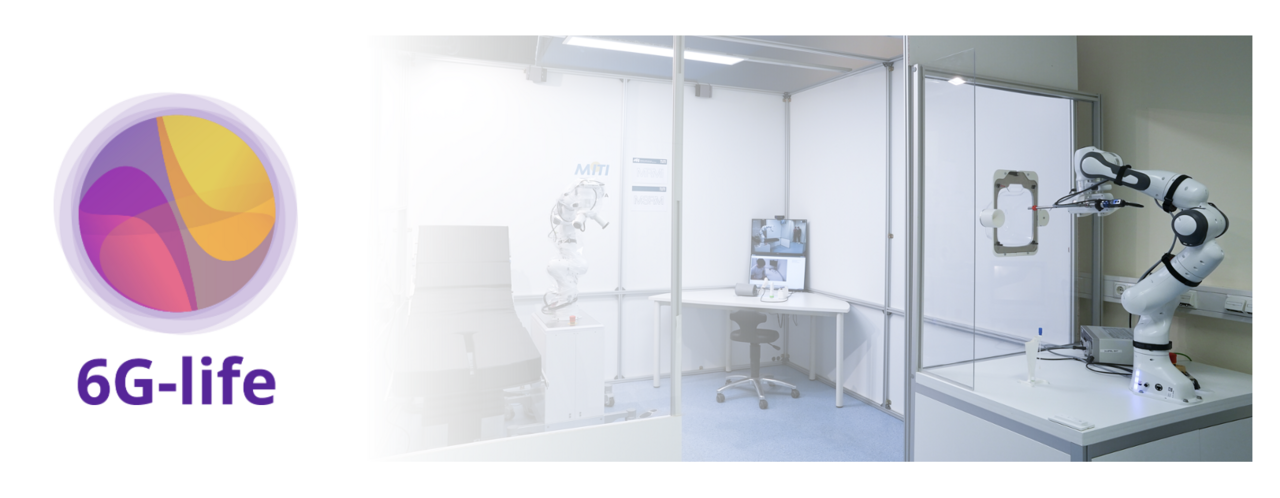Jonas Fuchtmann, M.Sc.

Contact
Room: Forschungsgruppe MITI, 1st floor
Trogerstraße 10, 81675 Munich
Phone: +49 (0)89 4140-7386
Email: jonas.fuchtmann(at)tum.de
Research Focus
- Diagnostic telemedicine
- Workflow-based assistance systems for surgical procedures
- Machine learning in medicine
- Audio-based assistance systems
6G-life
In clinical practice, a wide variety of sensor modalities are used to monitor the condition of patients, e.g. during a surgical intervention. Currently, data transmission is usually tethered to a local computing unit. As part of the BMBF-funded joint project 6G-life, a testbed is to be created in which next-generation wireless smart sensors will be interconnected within an intelligent network. The use of the 6G network concept as a consistent advancement of the current 5G and 4G standards opens up a multitude of new possibilities for patient monitoring. Dynamic data routing can be used, for example, to decentralize complex analysis functions in a resource-optimized manner or to present data to the end user in a situation-adapted manner.

ProteCT
In the COVID 19 crisis, the health care system bears a great deal of responsibility. Medical personnel are exposed to increased risks in the treatment of potentially infected patients, which must be mitigated: for personal protection, to interrupt infection chains and to avoid cross-infections.
In the ProteCT project, robotic telediagnostics will enable medical personnel to examine patients from a safe distance. This is to be made possible by a sensitive, robotic telediagnostic system. Doctors will be able to use telepresence to hold discussions and examine patients. The system also allows the collection of basic diagnostics (measurement of vital parameters such as temperature, blood pressure, pulse, oxygen saturation, etc.). As a critical measure in COVID-19 cases, the possibility of an oropharyngeal inspection is also being developed. The diagnosis is performed by mobile and flexible control stations.
In addition to system development, this project will investigate how telediagnostics can be made simple and effective. Once the system has been tested in a clinical study, the ProteCT system can help to maintain the health care system's ability to provide care even in crisis situations caused by epidemics.
Publications
2021
- Fuchtmann, J., Krumpholz, R., Berlet, M., Ostler, D., Feussner, H., Haddadin, S., & Wilhelm, D. (2021). COVID-19 and beyond: development of a comprehensive telemedical diagnostic framework. International Journal of Computer Assisted Radiology and Surgery, 16(8), 1403-1412.
- Fuchtmann, J., Krumpholz, R., Ostler, D., Naceri, A., Macari, D., Haddadin, S., ... & Berlet, M. (2021). New Method for Surgical Diagnostics-a Robotic Telemedical Approach. Surgical technology international, 39.
- Berlet, M., Fuchtmann, J., Krumpholz, R., Ostler, D., Feussner, H., & Wilhelm, D. (2021). Acting in a Robotic Environment Requires New Skills for Physicians. Current Directions in Biomedical Engineering, 7(1), 92-95.
- Krumpholz, R., Fuchtmann, J., Berlet, M., Hangleiter, A., Ostler, D., Feussner, H., & Wilhelm, D. (2021). Telemedical percussion: objectifying a fundamental clinical examination technique for telemedicine. International journal of computer assisted radiology and surgery, 1-10.
- Yu, K., Ostler, D., Fuchtmann, J., Zapaishchykova, A., Berlet, M., Navab, N., ... & Wilhelm, D. (2021). Clean-AR: Using Augmented Reality for Reducing the Risk of Contamination from Airborne Disease Agents on Surfaces. Current Directions in Biomedical Engineering, 7(1), 6-10.
2020
- Ostler, D., Seibold, M., Fuchtmann, J., Samm, N., Feussner, H., Wilhelm, D., & Navab, N. (2020). Acoustic signal analysis of instrument–tissue interaction for minimally invasive interventions. International Journal of Computer Assisted Radiology and Surgery, 1-9.
- Ostler, D., Wilhelm, D., Bernhard, L., Fuchtmann, J., Kranzfelder, M., Vogel, T., & Feussner, H. (2020). Machine Learning in the OR: A Collaborative Environment for Surgical Interventions in Visceral Medicine. Surgical Technology International, 37.
- Kranzfelder, M., Ostler, D., Fuchtmann, J., Friess, H., Feussner, H., & Vogel, T. (2020). Der künstlich intelligente Operationssaal. Der Klinikarzt, 49(06), 246-249.
Expert Lectures
- CURAC Academy 2021: "Roboter basierte Diagnostik für die Telemedizin"
- CARS 2021: "COVID-19 and beyond: development of a comprehensive telemedical diagnostic framework"
- Hamlyn Symposium 2021: "ProteCT - Protection against the Coronavirus through Robot-Assisted Telemedicine"
- CURAC 2020: "Analyse akustischer Signale der Gewebe-Instrumenten-Interaktion bei minimal-invasiven Operationen”
- CURAC 2018: “Markerless endoluminal navigation - Deep Learning Based Detection of Intestinal Segments for Colorectal Endoscopic Investigations”